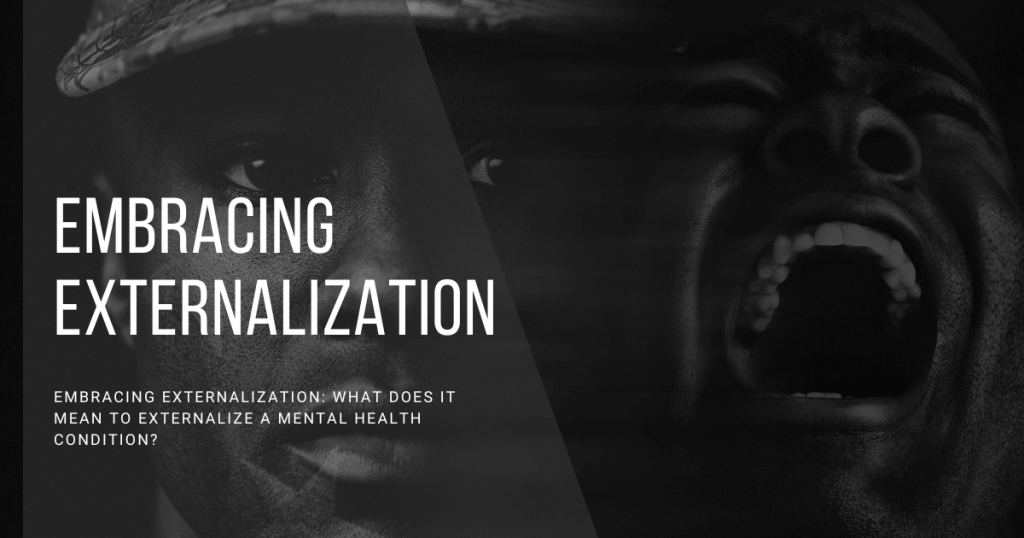Living with the effects of PTSD has been a challenging yet enlightening journey for me. Along the way, I’ve learned the importance of externalizing mental health – a concept that has the power to destigmatize mental illness and foster a more understanding society. By recognizing mental health as separate from an individual’s identity and viewing mental health diagnoses like medical conditions, we can combat shame and create an environment where seeking help becomes natural and accessible. In this blog post, I invite you to join me on this transformative path of externalization, as we empathize with those affected by mental health issues and work toward a brighter, more supportive future.
Understanding Externalization: Liberating from the Chains of Mental Health Stigma
Externalization is a powerful concept that has the potential to liberate individuals from the chains of mental health stigma and empower them to reclaim their identity beyond their conditions. When we externalize a mental illness, we separate it from the essence of who we are, recognizing that it’s merely a part of our life’s journey and not the entirety of our being.
The Struggle with Identity
For many who live with mental health challenges, myself included, the struggle with identity is a deeply profound and emotional battle. When diagnosed with a condition like PTSD, it’s not uncommon to feel defined and confined by it. We may question our self-worth, wondering if our struggles overshadow everything else about us. The weight of stigma and judgment can further exacerbate these feelings, driving us into isolation and preventing us from seeking help.
In the depths of my own mental health journey, I grappled with questions of identity. It seemed like my condition had taken center stage in defining who I was, overshadowing the many other aspects that made me a unique and capable individual. I felt lost in the label, believing it to be an unshakable identity I could never escape.
The Liberation of Externalization
The turning point in my healing journey came when I was introduced to the concept of externalization. At first, it seemed like a distant and abstract idea, but as I delved deeper into its meaning, it became a beacon of hope and liberation.
Externalization taught me that my PTSD was not my identity but rather a part of my life’s narrative – a shift from “I’m traumatized” to “I have experienced trauma” and it doesn’t define who I am. Just as a character in a story faces challenges and adversities, my PTSD is a chapter in my life, but it doesn’t define the entire book. It was a revelation that helps me break through the walls of self-doubt and isolation, paving the way for self-compassion and growth.
Embracing Wholeness Beyond Mental Health Challenges
Understanding externalization allows me to embrace my wholeness beyond my mental health challenges. It opened the door to self-acceptance, acknowledging that my experiences, emotions, and struggles were valid and deserved understanding and support. I am learning to be kinder to myself and treat my mental health with the same level of care as I would my physical health.
By externalizing my condition, I am taking crucial steps toward breaking free from the stigma that hindered me. I realized that my condition didn’t diminish my worth or potential; it was merely a part of my complex and beautiful life.
Inspiring Empathy and Understanding
As I embraced externalization in my own life, I also recognized its power in inspiring empathy and understanding among others. When we externalize mental health, we encourage society to view individuals with compassion, recognizing that their struggles are not weaknesses but human experiences to be supported and uplifted.
By sharing my journey and understanding of externalization, I hope to spark conversations that shift the societal narrative surrounding mental health. Through empathy and education, we can replace judgment with support and break down the barriers that prevent people from seeking the help they need.
Reducing Shame and Stigma: Embracing Mental Health as a Medical Journey
The burden of shame and stigma associated with mental health challenges can be overwhelming, leading many individuals to suffer in silence and isolation. However, by adopting a medical perspective toward mental health, we can dismantle these barriers and create a compassionate and understanding environment for those in need. Just as we treat physical health conditions with care and empathy, viewing mental health diagnoses in the same light empowers us to extend the same level of support and compassion to those facing mental health struggles.
Transcending the Stigma: Mental Health as a Medical Condition
For far too long, mental health has been shrouded in stigma, with people often fearing judgment and prejudice if they were to openly discuss their struggles. By recognizing that mental health is as significant and valid as physical health, we can break free from the chains of stigma and pave the way for open conversations and understanding.
As someone who has wrestled with PTSD and other mental health conditions, I know firsthand the burden of shame that comes with a mental health diagnosis. I used to believe that my struggles were somehow my fault and that I should have been able to overcome them on my own. However, adopting a medical perspective toward my PTSD was transformative. It allowed me to release the self-blame, understanding that my condition was no different from any other medical ailment such as the flu or a strained muscle.
Empowering Compassion and Understanding
Seeing mental health through a medical lens fosters empathy and understanding among individuals and society as a whole. Just as we wouldn’t stigmatize someone for seeking treatment for a physical illness, we should extend the same understanding to those seeking help for mental health conditions.
By embracing the medical perspective, I found the courage to seek professional support without feeling weak or defective. I realized that reaching out for help was actually an act of strength. This change in mindset allowed me to take charge of my mental health journey, seeking the necessary support and interventions with confidence and hope.
Normalizing Help-Seeking Behavior
One of the most significant impacts of adopting a medical perspective on mental health is normalizing help-seeking behavior. When mental health challenges are viewed with the same concern and urgency as physical ailments, it becomes natural for individuals to seek timely and appropriate support.
Breaking down the barriers of shame and stigma encourages individuals to address their mental health concerns proactively. Seeking help at the early stages of an issue can lead to more effective and timely interventions, preventing the escalation of mental health challenges and fostering better long-term outcomes.
Enhancing Accessibility to Interventions and Therapy Buy-In: Embracing the Power of Proactivity
Externalizing mental illness is not only a transformative tool in destigmatizing mental health but also a powerful catalyst for enhancing accessibility to interventions and therapy. By recognizing mental health challenges as external factors, seeking help becomes a proactive and empowering choice rather than a last resort. Embracing this perspective opens doors to more accessible and appealing mental health support, guiding individuals toward healing and growth with an open mind and a sense of optimism.
Proactivity Over Stigma: A Paradigm Shift
For years, stigma has acted as a formidable barrier, deterring individuals from seeking the help they need for their mental health challenges. The fear of judgment and misconceptions about therapy or interventions often lead people to delay seeking support until their struggles become unbearable. This delay in seeking help can exacerbate mental health issues, making the path to recovery more challenging.
However, by externalizing mental illness and treating it as an external challenge, individuals can shift their perspective. Seeking help becomes an act of proactivity rather than a response to crisis, empowering them to take charge of their mental well-being. The concept of externalization enables individuals to embrace the idea that seeking therapy or interventions is no different from seeking medical care for a physical ailment.
Embracing Therapy with Openness and Hope
In my personal journey with externalizing my mental health challenges, I experienced a profound shift in my attitude toward therapy. I used to view therapy as a last resort, fearing that it might signify my inability to handle my struggles independently. The weight of self-judgment and the stigma surrounding mental health had clouded my perception.
However, externalization helped me reframe my perspective. I began to see therapy as a valuable resource, a tool to help me navigate the complexities of my condition with professional guidance and support. Viewing therapy through this lens allowed me to approach it with an open mind and a sense of hope.
A Positive and Engaged Therapy Experience
Embracing therapy with an open mind led to a more positive and engaged experience. I felt more willing to share my thoughts and emotions, knowing that seeking help was an act of strength and self-care rather than a sign of weakness. The therapist’s ability to understand and empathize with my journey, without judgment, fostered a strong therapeutic alliance that was essential for my progress.
This shift in perspective also made me more receptive to various therapeutic interventions. I actively participated in exploring different approaches, tailoring my treatment plan to suit my unique needs. As a result, my therapy experience became more effective, enabling me to make significant strides toward healing and growth.
Embracing Externalization: Breaking Down Barriers for a Compassionate Society
The concept of externalizing mental health offers a path to destigmatization and increased accessibility to support. However, despite its potential benefits, several obstacles must be addressed for externalization to be widely accepted. These challenges require collective efforts to foster a culture of understanding, empathy, and advocacy for mental health.
1. Awareness and Education: Illuminating the Path
Promoting awareness about externalization and its significance is the first step toward transforming societal perceptions about mental health. Many individuals may not be familiar with this concept or its potential impact on breaking down stigma. Therefore, raising awareness through education and public campaigns is essential.
By sharing personal stories and experiences of individuals who have embraced externalization, we can humanize the struggles of mental health challenges. This can help others understand that mental health conditions are not a reflection of weakness or personal failure but rather a part of the human experience that can be managed with support and care.
Educational initiatives in schools, workplaces, and communities can also provide accurate information about mental health, dispelling myths and misconceptions that contribute to stigma. Empowering people with knowledge can lead to empathy and a more compassionate approach toward those experiencing mental health issues.
[Connect with Reggie D. Ford to speak on this topic at your organization]
2. Challenging Stereotypes: Breaking the Chains
Stereotypes surrounding mental health have deep roots in society, perpetuating stigma and discrimination. Overcoming these preconceived notions requires open conversations and empathetic dialogues.
Individuals who have experienced mental health challenges can share their stories and perspectives to challenge stereotypes and misconceptions. By speaking openly about their journeys, they can demonstrate that mental health is not a matter of weakness but rather resilience and strength in seeking support.
Media plays a significant role in shaping societal attitudes. Encouraging accurate and sensitive representations of mental health in TV shows, movies, and literature can combat harmful stereotypes and promote understanding.
3. Mental Health Advocacy: Paving the Way for Acceptance
Mental health advocacy is a crucial pillar in creating an accessible and accepting environment for all individuals. Advocates can work toward increasing funding for mental health services, improving mental health infrastructure, and removing barriers to access.
Lobbying for laws and policies that protect the rights of individuals with mental health conditions can also contribute to reducing discrimination and ensuring equal opportunities for everyone.
Advocacy efforts should prioritize the expansion of mental health resources in underserved communities and address the specific needs of marginalized groups. This inclusivity ensures that everyone has access to the support they need, regardless of their background or circumstances.
Embracing the Journey Toward Healing and Growth
My personal journey with PTSD has been a profound teacher, guiding me toward the transformative power of externalizing mental health. Through the lens of medical diagnoses, I have learned to separate mental health challenges from my identity, breaking free from the chains of stigma and judgment that once held me captive. This realization has empowered me to seek support without shame and has allowed me to embrace my worth beyond my struggles.
Externalization is not just a concept; it is a path toward destigmatizing mental illness and fostering a compassionate, judgment-free society. When we recognize that mental health is separate from individual identity, we replace shame with understanding and embrace empathy as the foundation of support. By viewing mental health through the same lens as medical conditions, we extend care and compassion to those facing mental health challenges, just as we would for any other health condition.
In embracing externalization, we are dismantling the barriers that hinder individuals from seeking help. It fosters a culture where reaching out for support is seen as an act of strength and self-awareness rather than weakness. By increasing accessibility to interventions and therapy, we empower individuals to take proactive steps toward their healing and growth.
As we continue on this transformative path, let us empathize with those affected by mental health issues and stand together in solidarity. Let us work collectively to build a future where mental health is valued and cared for as passionately as physical health. Remember, you are not defined by your mental health challenges; you are a resilient soul with the capacity to heal and grow. Help and support are readily available to guide you on your journey toward well-being and a life filled with purpose and fulfillment.
In the spirit of understanding and empathy, let us break down the barriers of stigma and judgment, replacing them with acceptance, compassion, and support for all. May our journey toward mental health acceptance be one of unity, love, and healing as we pave the way for a brighter and more compassionate future.
If your group could benefit from learning more about this or related topics, contact me today!







